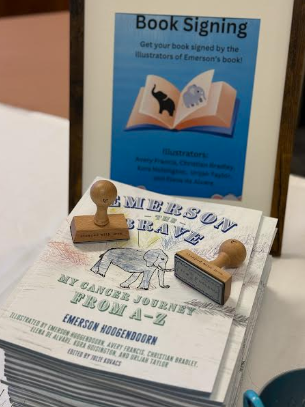Two siblings took the same class. By reputation, people knew the older brother as the smarter of the two while his little sister did not live up to the same academic standards. The brother had a great, natural academic ability, but his poor work ethic marched over it. He didn’t turn in his essays or homework, and by the end of the year, he wound up failing.
His sister, who felt like she wasn’t as smart as her brother and could not escape his academic shadow, surprised everyone with her success in the same class. She swatted away the negative thoughts and worked as hard as she could every day, turning in all her work. At the end of the year, she received the A people thought her brother would get.
“It was such a stark contrast between the student everyone thought was the smartest ever who wound up failing because he didn’t put forth the effort, and [the student who few believed in who] worked really hard and got the A,” said Advanced Placement (AP) English instructor Michelle Stoel who was the siblings’ teacher and saw the story unfold in her AP language and composition class a few years ago.
The sister prospered because of her effort and attitude, not her academic ability. In AP, students natural academic ability doesn’t compare to the effort they put into the class. “Effort can trump ability,” said Stoel. “It’s just a matter of putting in the time.”
AP English instructor Chris Norton sees similar situations regarding his own students’ attitudes in class. “I have students who have the ability to do well but are determined that they know the material and are unwilling to apply what is being taught,” said Norton, “and I have students with high abilities who go above and beyond and inspire me to help them achieve more.”
Many students believe AP is too difficult and that it’s not for them because they lack the ability to succeed. However, success in AP doesn’t come from the students’ natural academic ability. Success comes from the students’ mindset and the effort they put into the class. As shown by the brother’s performance, something as easy as turning in homework influences the grade earned in a class. Homework is the easiest part of AP, yet students still refuse to do it, then turn around and complain that they can’t succeed in AP when they receive a low grade.
In instructor Ken Strobel’s AP English classes, students who are earning a D or F have a 56.3% average on their homework grade. “The homework grade almost exclusively measures effort, not ability,” said Strobel. Like the brother, Strobel’s students are not succeeding in the class because they refuse to put in the effort. If a student isn’t willing to put in the effort to succeed in AP, then they will fail regardless of their ability as a student. Even the smartest students can fail an AP course if they don’t put their full effort into their work.
Putting in an honest effort makes students succeed even if they struggle to do so at first. “A student has never put in an honest effort and still received a low grade,” said Stoel, “I think real effort means you take the initiative to schedule writing conferences with me. I’ve watched a lot of students really grow as writers and completely turn their grades around.” When a student works hard enough, their effort overpowers their academic ability in AP and they succeed.
AP biology instructor Mike Jaeger has witnessed firsthand what hard work can do for students even if they have a lower academic ability. In all his years of teaching, Jaeger has had students who were “brilliant”, yet ended up in careers that require little to no education. Jaeger has also had students who “were not intellectually the brightest at our school,” but were hard-working and became doctors and millionaires before the age of 30. Anything is possible with hard work and effort; a student just has to apply those qualities to succeed.
“The real tragedy is [students’] failure to see a better version of [themselves],” said Jaeger who has also witnessed what a negative mindset can do to students. “There are a whole lot of students here who should be enrolled in the most challenging curricula West Ottawa has to offer,” said Jaeger, “Too many seem to reject challenge before being presented the challenge, to reject any level of discomfort, to seek what they perceive to be the easiest course, the paved path.”
Students hold themselves to high standards, which allows negative thoughts to flow through their minds and push them to choose an easier academic path, thinking they can become successful. However, that path won’t take them to the success they desire. “You don’t become an army general, an orthopedic surgeon, an inventor of technologies that will change the course of humanity by choosing the easiest route to what you perceive to be [comforting] at age 18,” said Jaeger. Students don’t become doctors or cancer-curing scientist by choosing the easiest path because they’re afraid to take up challenges like AP. Students need to believe in themselves if they want to succeed.
The sister in Stoel’s class shows how much a positive mindset and honest effort influences a student’s success in AP. She set aside the negative thoughts of self-doubt she had and succeeded. “A student must work to grow in their learning,” said Norton, “and that is what I consider to be success: a growth mindset.” A positive mindset influences a student’s success in AP just as much as effort does. Success in AP comes down to how the student thinks and how much effort they put into the class.
Success doesn’t come easy, especially in AP. Success in AP demands dedication and hard work from students, and without one or the other, students have no chance at succeeding, no matter how smart they may be. It’s up to students to push their way through the struggles of AP with positivity and a strong work ethic, because only then will they succeed.







